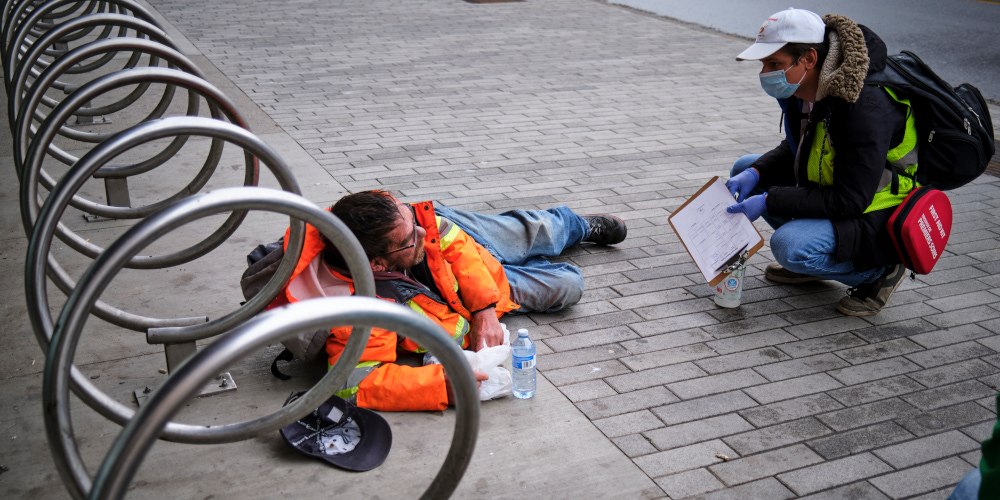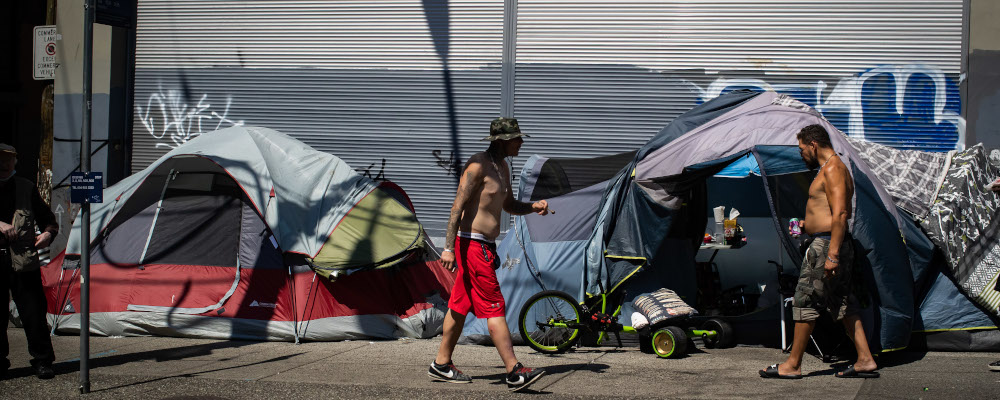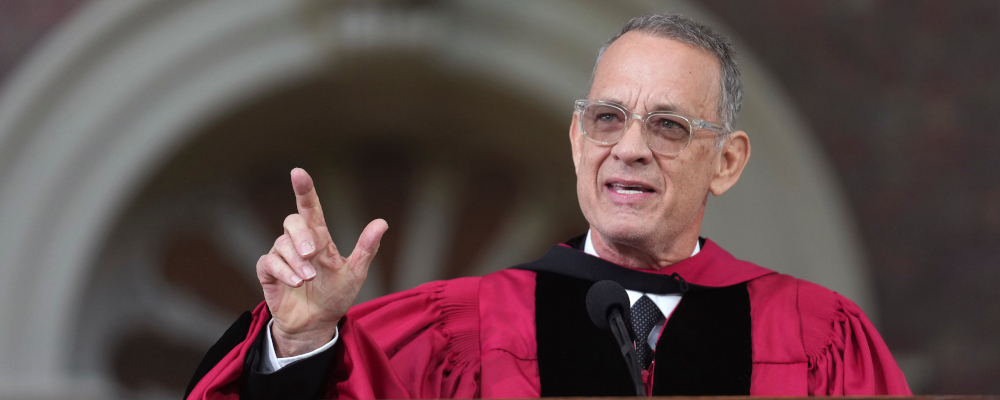It has become common in writing about politics to regret our lack of state capacity, which means that our government no longer has the expertise to carry out complex tasks like implementing a new payroll system or running a safe and efficient transit system. Unable to do difficult but ordinary things, we cannot even contemplate truly ambitious enterprises. We could not, for example, even consider building a new Trans-Canada railway—we can barely twin an existing pipeline across one and a half provinces. But there is a related political problem that is almost as debilitating as state incapacity, and that is state impotence. Even when a problem and its solution are clear and government has the capacity, our leaders are paralysed, not unable but unwilling to act. Some combination of moral cowardice or intellectual confusion has left our governing class is afraid to use the power of the state to protect citizens and uphold civil order. And a government that is stricken with state incapacity and state impotence, that will not or cannot use the power it has, is no better than a government without power, which is no government.
In 1956, with the British government facing malaise at home and humiliation abroad, the Daily Telegraph seized on a favourite gesture of Prime Minister Anthony Eden: “To emphasize a point, he will clench one fist to smack the open palm of the other hand—but the smack is seldom heard. Most Conservatives … are waiting to hear the smack of firm Government.” The phrase was used again in the 1980s, when Margaret Thatcher’s government was described as administering a similarly emphatic corrective when circumstances demanded it. It is time to revive the sentiment, if not the phrase. We need governments unafraid to wield power: the power to enforce the law and to pass new laws as required; the power to insist on order and, when necessary, impose it.
This is the second of two companion pieces, one focused on recent French civil unrest and the other on civil decay here in Canada, each one asking governments to shake themselves out of their political lassitude and enjoin a return to order.
A Return to Order: Canada
Even the dwindling number of partisans who still bristle at the claim that Canada is broken must admit that it sure looks and feels that way. Life in Canadian cities is noticeably coarser, uglier, and more violent than it was just a few years ago. Places once known for their civic beauty like Victoria, where I grew up, are now defaced by parks and city blocks that would be considered embarrassing in the third world. It doesn’t help that this street-level squalor has spread incongruously in the shadow of gleaming new glass and steel apartment towers, which contribute in their own way to a growing feel of social division and alienation in what was, until very recently, still mostly a city of wood, stone, and brick built on a human scale.
It’s the same story in my Calgary neighbourhood, where a drug consumption site has been a magnet for crime and delinquency since it opened in 2018.The CBC covered the opening by “reporting” that “Calgary’s first permanent, supervised consumption site is set to open downtown on Monday, offering ‘welcoming, warm, inclusive services’ for people in the community.” It’s this sort of witless credulity that tempts one to question just how vital the fourth estate really is to a flourishing society. In 2019, the new UCP government (for which I worked) promised to shut it down, but it’s still there and the neighbourhood has visibly deteriorated even as a hyaline forest of condominium towers has grown up around it. Last week I walked through Calgary’s Central Memorial Park—a gem of urban design—and every single park bench was occupied by a sleeping or unconscious derelict. The close-mowed grass was a parking lot for overflowing shopping carts and the flowerbeds were littered with discarded squares of burnt tin foil.
This problem is not unique to Canada. Cities from Los Angeles and New York to London and Paris are as bad or worse. Portland, Oregon, another historically beautiful city where I lived briefly in the early 2000s, now rivals Vancouver’s reputation as a progressive laboratory for incubating social pathologies. But a global problem cannot wait for a global solution: it is up to each city and each province to tend its own garden. Bad policies in Portland or San Francisco don’t excuse similarly bad policies in Canadian cities. Imitation may be the sincerest form of flattery, but when it comes to municipal government it can also be the deadliest form of apathy.
Optimists are quick to point out that our urban problems are still mild compared to the decay of American cities in the 1970s, when gas shortages and double-digit inflation crippled the economy, garbage piled up in the streets, left-wing radicals set off a wave of bombings, and crime was so bad that whole sections of major cities became no-go areas for residents at night. By the 1980s, water pollution, smog, and abandoned buildings had given urban landscapes a dystopian comic-book feel, and it was generally agreed that some major cities were simply ungovernable. If American cities were able to come back from that, they reason, we can recover from this.
The optimists are right about the past: things did get better, mostly as a result of economic growth and a focus on data-driven police work. But being right about the past is not a particularly difficult trick, and it doesn’t mean we should trust the optimists about the future. I have yet to hear a convincing explanation of where the impetus for social regeneration will come from this time—in Canada or America. It is just as plausible that a body politic weakened by the last illness is more likely to succumb to the next. If there are such things as social antibodies to disorder, we don’t seem to have developed them. Instead, the moral resolve of our governing class has weakened to the point that it is an open question whether they believe our civilisation deserves to survive.

One thing is certain: if we want renewal—economic, aesthetic, intellectual, or moral—the people who created the problem cannot be trusted with the solution. There is no hope for urban regeneration as long as our leaders continue to listen to the same activists and academics whose advice undermined the moral and legal foundations of our society and set us on the path to, if not yet collapse, then widespread hopelessness. Most experts only ever manage to be wrong in theory, their ideas confined to specialist journals where they can be safely ignored, but these experts were given the opportunity to experiment on real communities and real lives, and they demonstrated conclusively just how catastrophic their ideas can be in practice.
The conditions of our city streets after a generation of policy-making by our current experts should be a national scandal. But instead of responding with outrage and action, our governing class has doubled down on their failures, insisting that the right of every Canadian to squat semi-comatose in filth is such an essential component of human dignity that we cannot question it, let alone intervene. Human rights, they say, require us to supply the severely mentally ill and the addicted with the drugs to fry their brains and then abandon them to collapse alone in alleys. The reasonable desire of residents to feel safe in local streets and parks is met with impatience, as though the concerns of the law-abiding are an irritant to the lawless, and not the other way around. And all this, we are told, is the compassionate policy choice.

They are wrong, delusionally and demonstrably. A policy that perpetuates the immiseration of people who—as these same activists and academics like to remind us—are incapable of making better choices for themselves, is profoundly immoral. This incapacity, remember, is the rationale for treating homelessness and addiction as matters of health care policy rather than criminal enforcement, which is all well and good as long as the people suffering from those problems actually receive the substantial health care they need. Instead, the repudiation of law enforcement as a solution has become an excuse for doing the absolute bare minimum to keep them alive, and even less to improve the neighbourhoods around the well-funded drug sites and NGO offices.
It is time to face the fact, now surely undeniable, that there are far too many people who should not be at large in our downtown streets. It is neither compassionate to the severely mentally ill and the drug addicted nor considerate to the people they menace to persist with the current policy of negligent indulgence. Some should be locked up for serious criminality; others (the majority) should be treated for their conditions for as long as that takes, and only let back into society when they no longer pose a threat to themselves or others. Some may be able to participate in community-based recovery programs when they are ready, but many others should be cared for outside the community, humanely and permanently.
Providing high-quality recovery programs and institutional care would be expensive, but I expect that downtown residents and businesses would be willing to pay almost any cost to recover their neighbourhoods. The police, freed up from responding to multiple daily calls caused by the same few repeat offenders, would then have time to enforce other laws that would further improve the quality of life in our cities, stopping violent crime as well as low-grade anti-social behaviour, and clearing the clouds of pot smoke in public parks. Contrary to what we are told by our experts, restoring public order is not hard; governments have the legal tools to overcome activist objections to returning order to our streets. All it would take is the one thing our governing class lacks—the will to do it.
Recommended for You

Ginny Roth: J.D. Vance, Pierre Poilievre, and how they slice their economic pie

David Polansky: As President Biden leaves the race, will the Democratic Party hodgepodge hold?

Five Tweets on Western Canada’s devastating wildfires

RCMP spending to protect MPs may have risen 112% since 2018, as Canadian politicians face greater rise in threats










